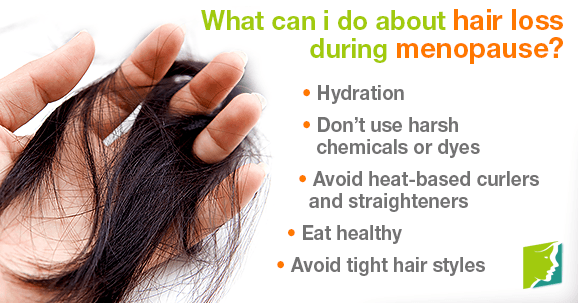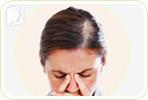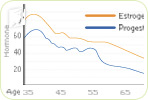The menopausal transition comes with a number of side effects, including hair loss. Hair can become brittle or weak, patchy and in some cases small bald patches may also appear. However, there are a number of ways to deal with this condition.
Defining Hair Loss during Menopause
Hormonal imbalance during menopause is the most common cause of hair loss. Normally, each hair grows approximately ¼ of inch per month, and continues growing for up to six years. After the hair falls out and another grows in its place. It's normal to lose 50-100 hairs each day. However, during menopause, you may lose more hair than usual, and it may not regrow.
Hair Loss during Menopause: Recognizing the Symptoms
To some extent, hair loss during menopause is normal, but excess hair may be a cause for concern. Some of the most commons symptoms of menopausal hair loss include:
- Hair falls out in large clumps when washed and large amounts of hair are left on the brush or comb.
- Small bald patches appear on the scalp.
- A red, oily, and/or itchy scalp.
- Noticeable hair thinning on the front, sides or top of the head.
Understanding Hair Loss during Menopause
In women, hair loss during menopause is caused by unstable estrogen levels in the body. Estrogen plays a prominent role in hair growth by helping hair grow faster and stay on the head longer. When estrogen levels are lower during menopause, it can lead to thinner hair and hair loss. Hair can also become flat, loose its shine, or break easily.
What Can I do About Hair Loss
There are a number of ways to reduce or cope with hair loss, including:
Hydration. Make sure you're well hydrated at all times. Doctors recommend 8 glasses of water a day.
Don't use harsh chemicals or dyes. These types of hair products can further thin and damage hair.
Avoid heat based curlers and straighteners. The heat can make hair more brittle and weak.
Eat healthy. There are a lot of vitamins important for healthy hair growth, and it's important that you make sure to eat a balanced diet to get them all.
Avoid tight hair styles. Pulling your hair back into tight ponytails or putting undue strain on it can cause it to snap and break because it's already brittle.
More Information
Hair loss is a common menopausal symptom, but it can be treated. For more information, click on the link below.
Sources
- Dr. McNair, Trisha.(n.d). "Hair Loss".Retrieved from www.bbc.co.uk.
- Mayo Clinic.(n.d)."Hair Loss".Retrieved from www.mayoclinic.com.
- The American Hair Loss Association. (n.d)."Womens Hair Loss". Retrieved from www.americanhairloss.org.




